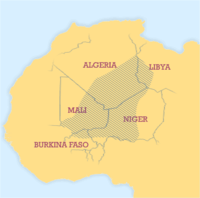The Touareg and the yellowcake
This is not just another story of how a large corporation exploits poverty in Africa to extract the wealth from African soil and make lots of money. Even if you don’t care that much about whether the Touareg people have a place to live and whether they can breathe, you might still want to pay attention to what is happening in the dusty, scorched plains of northern Niger.
 The Touareg people’s traditional homeland is one of the world’s most forbidding places to try and scratch out a living: the Sahara desert.
The Touareg people’s traditional homeland is one of the world’s most forbidding places to try and scratch out a living: the Sahara desert.
Tuaregs are mostly nomads. For over two millennia, the Tuareg operated the trans-Saharan caravan trade connecting the great cities on the southern edge of the Sahara via five desert trade routes to the northern (Mediterranean) coast of Africa. The Tuareg adopted camel nomadism, along with its distinctive form of social organization, from camel-herding Arabs about two thousand years ago, when the camel was introduced to the Sahara from Arabia. (wikipedia)
These days, many of the proud former masters of the Sahara are reduced to scratching out a living in the cities of West Africa, hawking trinkets like keychains and little knifes to tourists. Their homeland has been divided between five nations, the governments of which have very little regard for the nomadic desert dwellers. The Touareg would probably be fine to be left alone so they could live their lives in peace (or what at least what a Touareg would consider peace) but the problem is that parts of their homeland, in particular in northern Niger are rich in Uranium. Very rich. In fact, most of Europe’s nuclear power is produced using Uranium extracted in Niger. Uranium extraction is a very dirty business and the environmental effects in Niger have been disastrous.
Der Spiegel ran a story about the struggle of Almoustapha Alhacen trying to draw attention to the ongoing environmental and public health catastrophe in northern Niger. He himself is a worker of the French mining company Areva that operates all the mines in that area. Apparently, the only safety equipment the Areva mine workers get are simple dust masks. If that. When workers get sick, they go to the only hospital in the area, which is run by Areva. The doctors at that hospital have yet to ever diagnose a single case of lung cancer. Frequently, mine workers get sick and develop painful coughs, have trouble breathing and waste away. They are diagnosed with diabetes, AIDS or malaria. The few who managed to go to other hospitals were only diagnosed with lung cancer when they saw doctors who weren’t on Areva’s payroll.
The mining does not just make people sick. It uses huge amounts of precious fossil water reserves, destroys the fragile, sparse vegetation and kills the livestock the herdsmen rely on. The open dump where the radioactive waste from the mining activity is piled up is right outside the town of Arlit. Strong winds disperse radioactive dust all over the region.
The region is also politically unstable. The discontent with the mining problems were a big part of a violent Touareg revolt in the 90s. Even today, outsiders only get to Arlit by military convoy. And this is where this problem get another dimension: apparently Al Queda has a foothold in the Aïr Mountains. I have no idea what this presence looks like, but I can well imagine how attractive this situation is for an international organization intent on wreaking international havoc: a remote, mountainous area; discontented Touareg rebel groups and regular transports of Uranium yellowcake. Seems like an outfit like Al Queda would be all over it.
Of course it’s a complicated process to turn yellowcake into a weapon. But it is a critical ingredient for a simple kind of radioactive WMD a terrorist might consider using. The situation in Niger is ripe for Al Queda getting their hands on a significant amount of yellowcake. The question is whether we leave it up to Al Queda to exploit that situation, or whether the international community takes charge of the situation, forces Areva to clean up its act and helps protect the homeland of the Touareg. Personally, that’s what I care about most: the health of the workers has to be protected, they need decent medical care, and the environment needs to be protected. And let’s not give Al Queda an opportunity to exploit this situation.
Read more about the effects of the uranium mining in this report by Almoustapha Alhacen’s organization Aghir in Man.